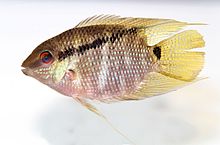Mesonauta
| Mesonauta | |
|---|---|

| |
| Mesonauta insignis | |
| Scientific classification | |
| Domain: | Eukaryota |
| Kingdom: | Animalia |
| Phylum: | Chordata |
| Class: | Actinopterygii |
| Order: | Cichliformes |
| Family: | Cichlidae |
| Tribe: | Heroini |
| Genus: | Mesonauta Günther, 1867 |
| Type species | |
| Heros insignis Heckel, 1840
| |
Mesonauta, the flag cichlids, is a small genus of cichlids native to the Amazon, Orinoco, Essequibo, Paraná and Paraguay basins in South America.[1][2] Mesonauta is included in the subfamily Cichlasomatinae.[1][3] They occur in various freshwater habitats such as streams and lakes, especially in areas with little water movement and aquatic vegetation.[4] They are generally found in small groups that stay near the water surface.[5] To avoid predators, adults may jump out of the water and juveniles mimic leaves.[4]
Some species are popular in the fishkeeping hobby and are frequently kept in aquariums.[6] These have traditionally been referred to as M. festivus, but following taxonomic reviews of the genus in 1991 and 1998,[7][8] the species most often seen in the aquarium trade are M. guyanae, M. insignis and M. mirificus.[5] The species are similar in general appearance, but they have different distributions and can be separated by the bars they show on the body when stressed or excited (very faint when relaxed).[5][8][9]
Species
[edit]There are currently six recognized species in this genus:[1]
- Mesonauta acora (Castelnau, 1855)
- Mesonauta egregius S. O. Kullander & Silfvergrip, 1991
- Mesonauta festivus (Heckel, 1840) (Flag cichlid)
- Mesonauta guyanae I. Schindler, 1998
- Mesonauta insignis (Heckel, 1840) ("Acará")
- Mesonauta mirificus S. O. Kullander & Silfvergrip, 1991
See also
[edit]References
[edit]- ^ a b c Froese, Rainer; Pauly, Daniel (eds.). "Species in genus Mesonauta". FishBase. February 2013 version.
- ^ Loiselle, Paul V. (1995). The Cichlid Aquarium. Germany: Tetra Press. ISBN 1-56465-146-0.
- ^ Kullander, S.O. (1998). "A phylogeny and classification of the South American Cichlidae (Teleostei: Perciformes)". In L.R. Malabarba; R.E. Reis; R.P. Vari; Z.M. Lucena; C.A.S. Lucena (eds.). Phylogeny and classification of neotropical fishes. Porto Alegre: EDIPUCRS. pp. 461–498. ISBN 978-85-7430-035-1.
- ^ a b van der Sleen, P.; J.S. Albert, eds. (2017). Field Guide to the Fishes of the Amazon, Orinoco, and Guianas. Princeton University Press. p. 379. ISBN 978-0691170749.
- ^ a b c Kutty, V. (2017). "Is that a Festivum?". Retrieved 28 January 2017.
- ^ Linke H, Staeck L (1994) American cichlids II: Large Cichlids. A handbook for their identification, care and breeding. Tetra Press. Germany. ISBN 1-56465-169-X
- ^ Kullander, S.O.; Silfvergrip, A.M.C. (1991). "Review of the South American cichlid genus Mesonauta Günther (Teleostei, Cichlidae) with descriptions of two new species". Revue suisse de Zoologie. 92 (2): 407–448. doi:10.5962/bhl.part.79799.
- ^ a b Schindler, I. (1998). "Mesonauta guyanae spec. nov., a new cichlid fish from the Guyana Shield, South America (Teleostei: Cichlidae)". Zeitschrift für Fischkunde. 5: 3–12.
- ^ "Mesonauta" (in Swedish). Nordiske Ciklidsällskapet. Retrieved 4 November 2017.
